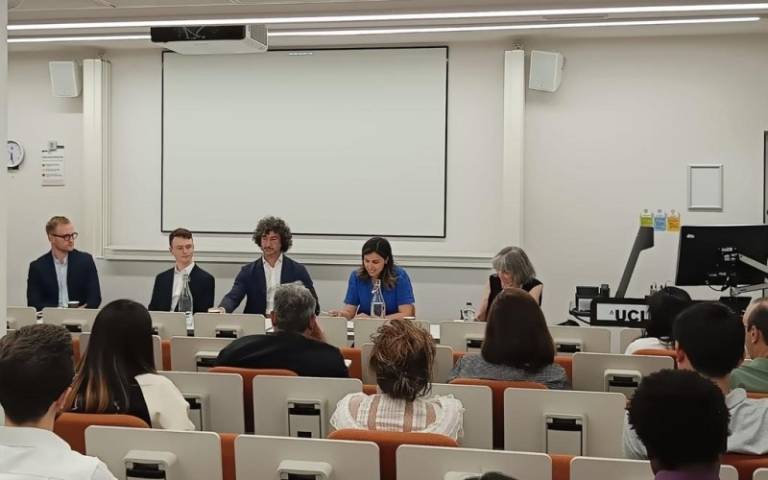UCL CLES hosts event with Professor Eleanor Fox (NYU) on regulating Big Tech
18 March 2024
The event took a comparative look at the transatlantic treatment of the Big Tech platforms and explored how US antitrust law compares with more aggressive approaches in Europe.

On 21 June 2023, Dr Deni Mantzari (Associate Professor in Competition Law and Policy at UCL Laws) hosted Professor Eleanor Fox (Walter J. Derenberg Professor of Trade Regulation Emerita at New York University School of Law) to speak about "The Big Platform Debate: Do we need new rules to rein in Big Tech, and do we need new modes to rein in divergent rules?".
The event, which included discussants Dr Gönenç Gürkaynak (ELIG Gürkaynak Attorneys-at-Law), Dr Andrew McLean (Edinburgh Law School) and Mr Todd Davies (UCL Laws), was well attended by academics, practitioners, policymakers and students. It sought to expose the issues currently facing competition law on both sides of the Atlantic as regulators look to tackle market power in the digital sphere, now dominated by some of the biggest firms in the world.
Professor Fox highlighted recent developments in the landscape of US antitrust law, and compared them with the approaches being taken in Europe and other parts of the world. She emphasised the power of incumbents to shape law and policy through lobbying, making it more difficult for governments to address market concentration without leaving loopholes to be exploited. The issue is especially acute, she argued, in the face of governments being many independent actors who must coordinate, while Big Tech is more concentrated and nimble.
Professor Fox discussed the latest developments in US antitrust law, comparing them to shifts in Europe and elsewhere around the world. She highlighted how powerful companies use lobbying to influence law and policy, making it harder for governments to tackle market concentration effectively. According to her, this problem is worsened by the need for coordination between regulators in different jurisdictions, in contrast to Big Tech companies which tend to be more agile.
In the face of these challenges, she advocated for a unified approach to competition law globally. She suggested removing neoliberal principles and incorporating distributional values, even if they conflict with economic efficiency. She argued that this strategy would align with most global jurisdictions, fostering harmony among regulators. This unity could lead to a consistent strategy for addressing digital market challenges.
In responding, the discussants sought to elaborate on what a harmonious competition policy would look like. Dr McLean emphasised the importance of ensuring that countries in the Global South are well represented in the policymaking process, and cautioned against an approach to tackling Big Tech which reproduced colonial power relations. Mr Davies cautioned against the focus on data in digital markets, and argued that the focus of discussions should more often centre on who controls the "infrastructural pipes" through which the data flows, and for whom those pipes are constructed. Dr Gürkaynak remarked that emerging markets are typically not the originating jurisdiction in terms of innovation in digital markets and that despite this they sometimes jump to the forefronts of breaking new ground in enforcement in digital markets, which is particularly risky because of the risk of losing the availability of the products or services in question entirely in that jurisdiction. He therefore remarked that harmonious enforcement is very important also to ensure that there isn't any overenforcement due to scaremongering, and that data and economic analysis based enforcement takes the lead in striking a balance.
 Close
Close

